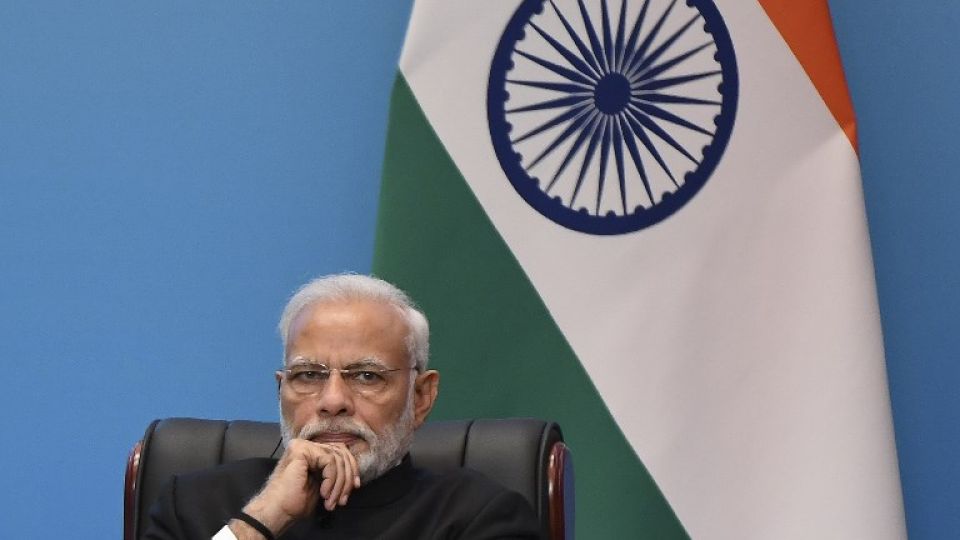February 3, 2020
With the government turning its citizens against each other, the world’s largest democracy is fast losing its legitimacy as a secular republic.
Indians protesting against the draconian Citizenship Amendment Act (CAA)—which essentially disenfranchises minorities, especially Muslims—were on Thursday, 30 January, faced with a new reality when a 17-year-old shot at peaceful protesters, injuring one, near Jamia Millia Islamia in New Delhi. Even as they commemorated 72 years of the assassination of Mahatma Gandhi that very day, they wondered if the juvenile delinquent shouting ‘the game is over’ for azaadi seekers might as well be a contemporary avatar of Nathuram Godse.
Only that the delinquent this time around was given a free hand by policemen who stood still, their arms folded. And as expected, right-wing television anchors falsely projected the shooter as a protester while he was, in fact, a right-wing zealot with a fetish for Lord Ram, weapons and ‘Hindu rashtra’.
As if on cue, a man on Saturday fired bullets in the air, shouting ‘only Hindus will have their way in India’, near the anti-CAA protest site at Shaheen Bagh in New Delhi. Police were quick to claim he was ‘self-radicalised’ by watching news and videos on social media, ensuring no link with the ruling BJP, if any, was exposed.
The gun-wielders have turned heroes overnight for Hindutva supporters who have bought Prime Minister Narendra Modi’s narrative that ‘Hindus are in danger’. But what is really in danger are the ideals of secularism, democracy and the constitutions Indians of the previous generations valiantly fought for.
The recent gun incidents came on the heels of the BJP-led government’s minister of state for finance Anurag Thakur exhorting people to ‘shoot the traitors of the country’ at a rally while campaigning for Delhi elections; home minister Amit Shah asking voters to choose between Modi and Shaheen Bagh; Uttar Pradesh chief minister Adityanath claiming ‘those who support terrorists in Kashmir are protesting at Shaheen Bagh’; and Prime Minister Modi himself asking people to ‘identify’ anti-CAA protesters by their clothes, indirectly referring to Muslims.
After Saturday’s incident, a Delhi-based friend texted me, ‘I was at Shaheen Bagh jab goli chali’ (I was at Shaheen Bagh when the firing happened). No mention of shock or surprise, as if it was just a daily occurrence. Why, I asked myself, was my friend not shocked when someone opened fire right next to her? Because this was a long time coming. Each new iteration of violence in India today is just a reflection of an irreparably polarised society.
The Right-wing Hindutva leaders may consider taking a break now that their relentless effort at communalising the Indian public has now come to fruition. The making of a ‘self-radicalised, lone wolf’ Hindutva fanatic has been completed. Once the project of projecting minorities as monsters take shape, it is the majority who do the discriminatory state’s bidding. Earlier, you needed the killing of a cow, or at least the rumour of the killing of a cow, for the Hindutva lynch mob to turn against a fellow human being. Now, all you need is the chanting of the ‘azadi’ slogan for a lynch mob to come charging at you with clubs or lone wolves brandishing a gun.
From lynch mobs maiming and killing one individual with a lathi to one individual wielding a gun to terrorise thousands of peaceful protesters, the march towards turning Indians against one another has turned one notch sophisticated.
For the uninitiated and the ones with fading memory, India has remained the hotbed of communalism ever since—and of course even before—it came into existence in 1947. From Gujarat to Delhi, Kashmir to Muzaffarnagar, the fire of communalism, often stoked by state functionaries, politicians and communal leaders, has engulfed India almost every decade. But the extent to which state machineries and media are used to silence citizens in the past six years, after Narendra Modi’s ascent to power, was unprecedented.
In today’s India, it is a crime to be a student, an activist, an inquisitive citizen or a sensible human being because they discuss and ask difficult questions on rising unemployment, downward spiral of the economy, and growing instances of violence. Children aged as young as nine are interrogated for performing a play critical of the CAA, their parents and teachers being accused of sedition.
To be Muslim seems to be the biggest of all crimes. It is, therefore, not at all surprising that the machinery of the state in tandem with the media have been used to punish, vilify and threaten those who ask questions and dare to puncture the narrative of a monolithic nation.
In a span of a few years, the image of a Muslim individual has been turned into that of an outsider and a potential threat to the ideals of a ‘Hindu’ India. From Mohammad Akhlaq to Pehlu Khan, Mohammad Qasim to Tabrez Ansari, the image of a Muslim individual is that of a helpless individual begging for life, hands folded into a ‘namaste’, in front of soon-to-be executioners before being beaten to a pulp and turned into a corpse not long after.
Having witnessed, often silently, the undignified deaths of fellow citizens for far too long, Indians today have lost a sense of human dignity themselves. A society in which an individual or a community is stripped of human dignity and rendered the ‘other’ is moribund. With citizens being manipulated into coming to blows against one another, India has lost its credentials as a secular democracy and a tolerant society.
As India’s friendliest neighbour, and the most susceptible to the Hindutva frenzy, we in Nepal have a lot to be cautious about.


